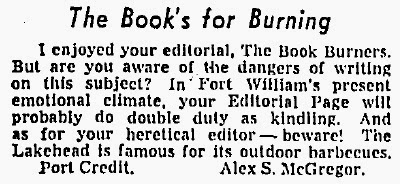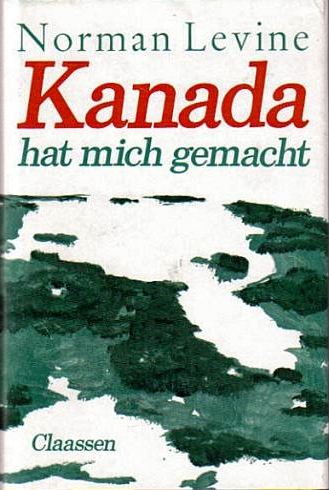 |
| David A. Balfour 1889 - 1956 RIP |
The joke that is Rob Ford isn't funny anymore, right? We all know where he's heading, the only real question is whether he'll be taking anyone with him. Torontonians, take extra care as you cross at the intersection, a black Cadillac Escalade may be just around the corner.
No, not that funny at all. That's where Ford breaks with the buffoons of the city's past, my favourite being Controller David Balfour. If the name seems familiar, it may be that you've once strolled through Toronto's David A. Balfour Park.*
When not protecting children from those who would teach them to spit, he was working to shield their eyes and those of their parents from "salacious books" being circulated by lending libraries. Balfour's obsessive focus on "immoral literature" provided many column inches for Globe & Mail City Hall reporter Frank Tumpane. The six on the right come from the 22 March 1947 edition.
Balfour was a great collector of the material he sought to ban, encouraging others in the battle to send filth his way. "I stick them in the top drawer of my dresser," he told council. "I'm ashamed of them."
The controller was short on titles, amassing a lengthy list that he was never willing to share. However, over the years he did mention five titles, one of which was Jan Peel's The Bed and the Blonde (Toronto: News Stand Library, 1949). I don't have a copy in the top drawer of my dresser, so can't provide a cover image. Here are the rest:
 |
| Forever Amber Kathleen Winsor New York: Macmillan, 1944 |
 |
| Kitty Rosamond Marshall Toronto: Collins White Circle, 1944 |
 |
| Duchess Hotspur Rosamond Marshall Toronto: Collins White Circle, 1947 |
 |
| The Flesh is Willing James Clayford Toronto: News Stand Library, 1949 |
 |
| The Globe & Mail, 30 September 1949 |
* David Balfour is, of course, also the name of the central character in Robert Lewis Stevenson's Kidnapped, which was published just three years before the controller's birth. I'm not certain that this wasn't just a coincidence.




















































